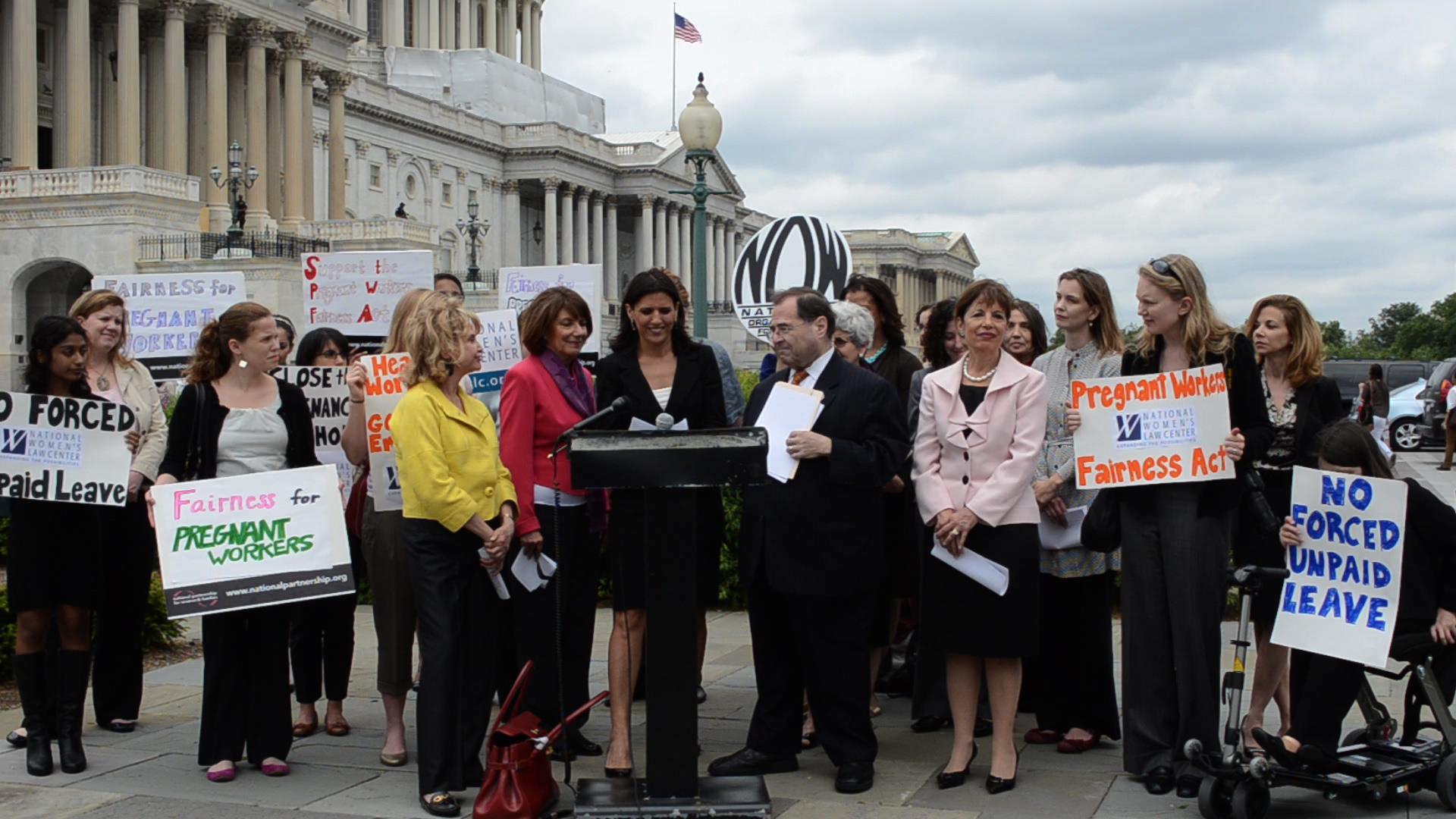
Lucy Cheskin is a student at Harvard Law School and a member of the Labor and Employment Lab.
In February, Congresswoman Brittany Pettersen made headlines when she cast her vote against the House’s proposed budget deal with her four-week-old baby in her arms. Faced with the House’s prohibition on voting by proxy, Rep. Pettersen returned from her home district in Colorado shortly after giving birth in order to make her voice heard and discharge her duty as her constituents’ representative. Despite the chamber’s 236-year history, Rep. Pettersen is only the 13th person to give birth while a member of the House. She is far from the first, however, to attempt to or to actually vote by proxy. During the pandemic, when the practice was permitted, many House members availed themselves of the option, including about 80% of all representatives by mid-December 2021. The practice was ended, however, when control of the House returned to the GOP in January 2023.
While proxy voting may have initially been a creature of the pandemic in the House, it also served as a critical accommodation for members of Congress in the periods directly preceding and following the birth of their children. As a result, this January, Rep. Pettersen, alongside Rep. Luna, who had previously missed votes after giving birth, introduced a resolution that would have allowed “new parents . . . to vote by proxy for up to 12 weeks” and allowed “pregnant Members to proxy vote if a pregnancy-related medical condition prevents travel.” However, despite their efforts and a rare successful gathering of sufficient signatures for a discharge petition to force a vote on the issue, the push for proxy voting for new parents ended after Rep. Luna struck a deal with the Speaker to shelve the petition in exchange for a commitment to “pursue options to make the House more accessible to new parents.” However, the concern remains that the suggested alternatives still keep lawmakers from recording their votes when they are unable to travel due to childbirth or pregnancy-related conditions.
The House leadership’s resistance to an option that would allow pregnant and parenting representatives to record their votes remotely not only is cause for concern within Congress. This resistance also reflects and proxies a broader national landscape that provides insufficient workplace protections for both pregnant and parenting workers. As A Better Balance, a national leader on issues facing pregnant and parenting workers, clearly articulated in their call for the passage of the Proxy Voting for New Parents Resolution, “Millions of working parents, particularly those in low wage jobs, remain in need of workplace protections that ensure they do not have to choose between their job and caring for themselves and their newborns. Paid leave, as well as pregnancy and lactation accommodations must become the norm – not the exception. Congress should lead by example and support working moms and parents – starting with their colleagues in office.”
According to a 2022 study, 20 percent of mothers surveyed had faced pregnancy discrimination in their workplaces and 23 percent “considered leaving their jobs due to a lack of reasonable accommodations or fear of discrimination during a pregnancy.” Furthermore, the United States is one of only a few countries globally that fails to mandate some form of paid parental leave, with only 13 states and the District of Columbia filling in the gap at the state level. A lack of nationwide or even broad statewide paid family leave requirements leaves large swaths of the country’s workers without such critical access. Notably, “[a]s of March 2023, only 27 percent of civilian workers had access to paid family leave through their employer.” This number drops dramatically for the lowest-wage earners, with only 6 percent having such access, a result especially concerning given that due to persistent occupational segregation and discrimination, women of color are disproportionately likely to hold such jobs thus perpetuating further gender and racial inequity.
The passage of the Pregnant Workers Fairness Act (PWFA), which went into effect in June 2023, was a critical step in combatting the barriers pregnant employees face in their workplaces. Notably, the Act makes it unlawful for an employer to fail to “make reasonable accommodations to the known limitations related to the pregnancy, childbirth, or related medical conditions of a qualified employee” among other important changes. This affirmative accommodation regime fills in a critical hole that existed under the Pregnancy Discrimination Act (PDA) which had previously served as the principle federal law providing protections to pregnant workers but had been interpreted to require plaintiffs to show that their employers provided accommodations to non-pregnant workers “similar in their ability or inability to work,” yet failed to grant such accommodations to pregnant workers, creating a “comparator problem.” As such, though the PDA was enacted in 1978, a study conducted decades later in 2013 still estimated that “more than one-quarter million women [were] denied their [accommodation] requests each year” (a figure largely considered to be an undercount due to the number of employees who do not ask for needed accommodations).
While the PWFA represents a transformative victory for workers and advocates fighting pregnancy discrimination, the Act’s path since its enactment has not been without roadblocks. In addition to challenges to the EEOC’s PWFA regulations, one challenge attacks the Act itself, ironically because proxy voting, under the House’s pandemic-era rules, was used to pass the Act. As this case makes its way through the courts and Congress continues to wrestle with the proxy voting issue, this time explicitly in the context of accommodating pregnant and parenting lawmakers, it is critical not to lose sight of the underlying issue animating both the PWFA and the proxy voting fight—the systemic failure of employers to provide equitable, safe, and discrimination-free workplaces for pregnant and parenting workers.
Workplace discrimination against pregnant and parenting workers is both a gender and racial justice issue. When workers, from members of Congress to the most vulnerable workers, are pushed out of or not permitted to do their jobs through denial of reasonable accommodation, structural inequity is only further entrenched and the workplace continues to be conditioned by gendered assumptions about work and workers. As the PWFA instructs, workers should not be denied a paycheck or stripped of the ability to carry out their work simply because an employer is unwilling to provide reasonable accommodation. This imperative calls for both guarding against continuing challenges to the PWFA and for attending to the ways in which workplaces in their failure to protect pregnant and parenting workers perpetuate gender, racial, and economic injustice.










Daily News & Commentary
Start your day with our roundup of the latest labor developments. See all
February 27
The Ninth Circuit allows Trump to dismantle certain government unions based on national security concerns; and the DOL set to focus enforcement on firms with “outsized market power.”
February 26
Workplace AI regulations proposed in Michigan; en banc D.C. Circuit hears oral argument in CFPB case; white police officers sue Philadelphia over DEI policy.
February 25
OSHA workplace inspections significantly drop in 2025; the Court denies a petition for certiorari to review a Minnesota law banning mandatory anti-union meetings at work; and the Court declines two petitions to determine whether Air Force service members should receive backpay as a result of religious challenges to the now-revoked COVID-19 vaccine mandate.
February 24
In today’s news and commentary, the NLRB uses the Obama-era Browning-Ferris standard, a fired National Park ranger sues the Department of Interior and the National Park Service, the NLRB closes out Amazon’s labor dispute on Staten Island, and OIRA signals changes to the Biden-era independent contractor rule. The NLRB ruled that Browning-Ferris Industries jointly employed […]
February 23
In today’s news and commentary, the Trump administration proposes a rule limiting employment authorization for asylum seekers and Matt Bruenig introduces a new LLM tool analyzing employer rules under Stericycle. Law360 reports that the Trump administration proposed a rule on Friday that would change the employment authorization process for asylum seekers. Under the proposed rule, […]
February 22
A petition for certiorari in Bivens v. Zep, New York nurses end their historic six-week-strike, and Professor Block argues for just cause protections in New York City.